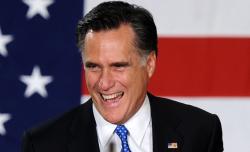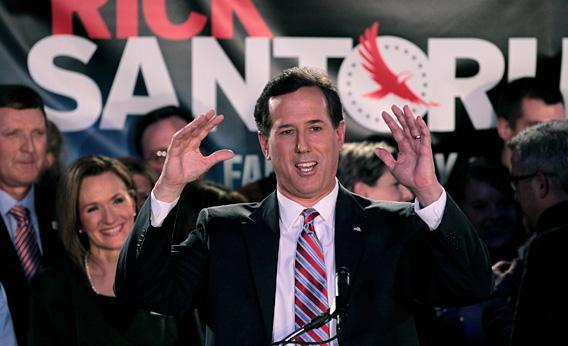The Iowa Republican caucus was a tie and a blowout. The finish was so close that statistics majors at Iowa State will probably see it as a question on the final. Mitt Romney and Rick Santorum essentially tied at 25 percent, with Ron Paul a breath behind at 21 percent.
But when you measure the key question in the Republican campaign: Do you vote for the electable candidate Romney or the candidate who speaks to your heart—Santorum and Paul—it was a 46-25 trouncing for the heart over the head. According to entrance polls, of those voters who wanted a true conservative, Santorum got 36 percent and Romney got just 1 percent. (That is not a misprint.)
Though the top two candidates tied, Santorum was the big winner. Weeks ago, the smart people thought that tonight he’d be addressing an empty ballroom of lonely, sad balloons. Instead, the crowd at his victory party is so thick I’ve practically got supporters on my lap as I type this. Santorum is now the only Flavor of the Week candidate to actually win anything, which makes him a genuine threat to Romney, at least for the moment.
In 2008 Romney won 25 percent of the Iowa caucus vote. This time he got the same, despite the fact that the issues favored him more. Voters said improving the economy was the issue they cared the most about. That was the centerpiece of his pitch—that his business experience gave him unique insight and ability to fix the economy. But entrance polls backed up the softness of his support. Forty percent of those who voted for Romney said they had reservations about him.
The Santorum surge was real. Based on entrance polls, of those who decided at the last minute, 33 percent went for Santorum and 23 percent went for Romney. It was a ratification of Santorum’s closing argument: Don’t settle. Santorum and Paul tapped into the prevailing emotion in Republican politics: conviction over expediency. If Santorum hasn’t already compared himself to Tim Tebow, he will be doing it soon. Santorum ultimately did nearly 380 events in Iowa, and polls showed voters respected him for that. “I thought about how he worked the state and his approach was all about building relationships with Iowans,” Mary Maltby emailed me after deciding on caucus day to vote for Santorum. “Listening, talking, discussing the issues of our country and our lives. I want a leader that can get in the midst of the people he/she serves and listen and respond to the needs of the majority of Americans. Rick Santorum worked hard for the votes he is capturing.”
But there are many nights to come. Santorum won around 30,000 votes, about 10,000 fewer than Mike Huckabee in 2008. That’s a spark for his campaign, but perhaps not a bonfire.

Photograph by Jewel Samad/AFP/Getty Images
Now he has to hope that the money comes in. He’s headed straight to New Hampshire Wednesday, a state where Romney has a strong organization and plenty of money. Santorum’s organization is also going to face extreme growing pains. Everything from scheduling events to fielding press calls is going to get more difficult.
And the campaign is going to get uglier. Santorum is going to start taking more abuse from Paul and the other candidates, who will seek to recover from their weak Iowa showings. Romney and his allies may shell Santorum in the same way they battered Newt Gingrich. Millions of dollars of ads knocked Gingrich down to a fourth place finish with just 13 percent of the vote. Gingrich, who now calls Romney a liar (echoing Mike Huckabee’s claim from 2008 that Romney was “fundamentally dishonest”), looks like he may spend his declining days emptying his artillery. He has already purchased a full-page anti-Romney ad in the conservative Manchester Union Leader. This weekend there are two debates where things are likely to get testy.
One of the open questions going into the caucus was how much evangelical voters would participate. They turned out in the identical numbers as the last caucus, with 58 percent of the voters self-identifying as evangelical. They helped Santorum with his surge. “Everyone talks about the economy,” said Bill Yewell of Augden, “but Santorum comes at it from a different way. If we take care of the social issues and the family, the economy will come around.”
As if to solidify Romney’s position as the candidate the base isn’t excited about, shortly before the final votes were counted Ben Smith reported that John McCain would endorse Romney. McCain, too, had trouble firing up GOP voters.
Santorum shouldn’t be surprised. He endorsed Romney in 2008, saying he had to do what he could to keep McCain from being president. Now McCain is returning the favor.
